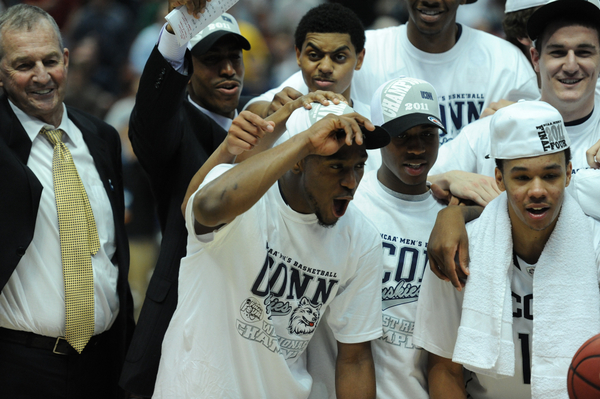NCAA Threatens to Ruin UConn’s Title Defense Before It Even Gets Started
Posted by rtmsf on October 25th, 2011We promise to make our foray into jurisprudence short, but did you ever wonder why the American system of governance has been copied worldwide for the better part of two centuries? Even if in practice what it means to be an American hasn’t always withstood scrutiny, the underlying basic principles and tenets of the United States as written into its Constitution remain an ideal the entire planet respects and admires. Our system implies a certain contract between the government and its people — essentially, that you’re guaranteed a fair shake when it comes to life, liberty and the pursuit of happiness. This is one reason why the Founding Fathers wrote in Article I, Section 9, of the Constitution that “No Bill of Attainder or ex post facto Law shall be passed.” In terms of criminal law, it essentially meant that the Congress (or states, per Section 10) couldn’t go around changing legal consequences on people they don’t like after they’ve already been punished for it — or, in simpler terms, tacking on another 20 years to someone’s sentence after they’ve already received a sentence of ten. With some exceptions, ex post facto laws are generally verboten in America and around the world, and with good reason — they create politically charged after-the-fact situations where there should be none.
Defending national champion Connecticut probably feels like the NCAA is channeling Chairman Mao given president Mark Emmert’s comments to the Knight Commission on Monday suggesting that the NCAA is considering a plan that would immediately raise the Academic Progress Rate (APR) threshold for postseason eligibility to 900. You read that correctly — the NCAA’s Board of Directors will vote to consider the institution of an APR minimum that could keep schools out of March Madness a mere five months from now. Needless to say, UConn men’s basketball, sporting a not-quite-good-enough 893 in its four-year rolling APR average, is feeling a little unfairly singled out right now. School president Susan Herbst responded by diplomatically asking for more time:
I am strongly in favor of holding colleges and universities responsible for meeting APR standards. There are many reasonable penalties for failing to meet these standards, and a postseason ban is one of them. My only addition to the conversation is that institutions need time to prepare, to make sure that all of their academic supports are in place, so that players and coaches are ready to meet the expectations of presidents and the NCAA. I don’t know that the ramp-up time is settled yet, in the discussions.
And she’s right. UConn sources told the Hartford Courant that it’s unlikely the NCAA will implement the measure this school year, but if the organization feels like it needs to prove a point by banishing the defending champs to its dorm rooms next March — guess what, it has every right to do so. Even though Connecticut has already been punished for its poor APR score by losing two scholarships this season, the NCAA as a private organization could feel free to further punish the school in an ex post facto manner through this measure knowing fully well that the Husky program has no mathematical chance to remediate its score. In terms of equitable application of its regulations, the lack of notice from the NCAA for such a serious penalty is downright appalling. In terms of a fundamental sense of fairness, the lack of so much as a reasonable chance for UConn to meet the new guideline appears nothing short of arbitrary, capricious and malicious.
Of course, Connecticut wouldn’t be the only school possibly impacted by an immediate rule change to an APR minimum of 900 — it’s simply the most compelling. Thirty-two other D-I schools, including notables such as Arkansas (892), Ball State (892), St. Bonaventure (894), and Missouri State (896), could also be on the outside looking in on Selection Sunday no matter their qualifications on the hardwood. While we would love to give the NCAA the benefit of the doubt on this one, we certainly cannot be sure until the decision is made on Friday — let’s hope that the reasonable minds sitting in the boardroom that day don’t put an unfair damper on the 2011-12 season before it so much as gets started.











































